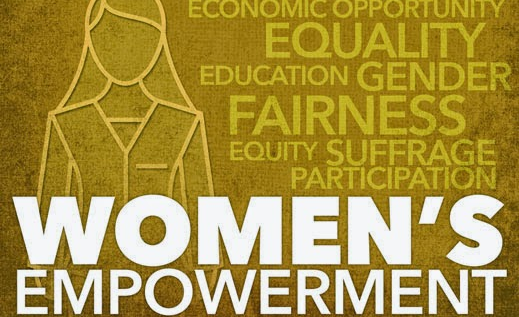Assi Woet Patti Watti Korren Yee Sawgaat Diwaan,
Lali Akh Nili wath Habbi Akh Parcha Lonchi Gangit (Naseem Shafaie)
It is commonly known that women are subjected to gender bias from the foetus until they die. Women continue to face discrimination, vulnerability, and oppression in all realms of life; as a result, empowerment is necessary in all spheres of life. Women must fight against specific assumptions that call for more strength in order to combat socially imposed gender inequalities. Such strength stems from the process of empowerment and empowerment will emerge from the education. And we personally see that girls currently outperform boys in the academic, scientific, medical, artistic, technological, media, administrative, and sports domains. More girls are already into the research field and perform exceptionally outstanding. Women have proved their mettle in every field.
Understanding Empowerment in a Deeper Sense
So, to empower means, in this case, to give women and other individuals the capacity and the opportunities to make decisions that transform their circumstances or the circumstances of those around them. This includes the aspect of making certain choices or options – whether within the household unit, the community or even society at large. For women, sociologically, resurgence recognizes first the fact of being more than oneself and that such expansion can take place in all spheres: home, school, work, and society at large.
Consider a woman who is frankly the decision-maker of her household. It does not matter if his or her education goes beyond primary. Empowerment, in this case, is allowing this woman whatever the situation, to express herself, take part in family issues and more importantly, contribute to family deliberations. Next, we see in the education of the girl child, for instance, going beyond just letting the girl child go school, and encouraging her to pursue the endeavours of her choice is also a very liberating approach of transforming not only her but the society as well.
The evidence presented both in practice and in theory suggests that this form of empowerment is consistent, philosophically speaking, with the concepts of equality and agency, this glossed over by thinkers like Simone de Beauvoir, who stated that “One is not born, but becomes a woman”. In this regard, De Beauvoir’s position infers that there are certain social structures responsible for the position occupied by women. Empowerment therefore can only be complete when such structures are challenged and reconstructed.
Shifting the Focus of Empowerment Away from Cultural and Social Constructs
Empowerment is usually viewed as the visible social aspects such as education and professional occupations. Nonetheless, the essence of empowerment must extend beyond these surface indicators. For example, the wearing of a hijab by most people is stereotypically viewed as a form of oppression to women. However, it can be empowering when a woman chooses to wear it on her own instead of being forced to wear it. Hence, the veil serves the purpose of beauty rather than an act of oppression. Wollstonecraft and John Stuart Mill among other philosophers have been staunch believers of the principle that self- empowerment includes the ownership and self-determination of an individual.
Promotion of Women at Various Stages of Their Lives
The growth of individual and collective power is gradual. For example, a father who encourages his daughter to seek an education and follow her dreams is helping her feel powerful. A mother, who taking care of the house and children, shares her voice in the family decisions, is also an example of power. This silent power, when mothers instil certain values and opinions to their children, is often overlooked. Women’s empowerment, prosperity, progress, and welfare are highly reliant on education.
In addition, there are women in employment, from makeup artists and tailors to pilots, scientists and politicians, which shows the diversity of empowerment. Every woman no matter what profession or class she belongs to, can become empowered in one or another constructive way.
Empowerment as a Societal Undertaking
There is a paradigm shift in society when men and women join hands to flatten the system that has oppressed women for ages. Empowerment is not the concern of women only but men as well, particularly fathers, brothers and husbands. “The strength of a nation derives from the integrity of the home”, as Confucius would have put it, captures the essence of family in this case.
The involvement of fathers and brothers in women’s education, employment, and independence, is not limited to the individual, but extends to the society as well. Also, there is no international movement for the empowerment of women that does not address men. This can be viewed as intergenerational empowerment within the society that internalizes the spirits of both men and women.
Philosophical Reflections on Women Empowerment
As with any human relations conflict, and especially when considering empowerment of women, there have been a number of considerations put forth by philosophers across all schools of thought. Friedrich Nietzsche, for instance, emphasized the importance of individual, rather than societal, definitions in the concept of self. The Overman concept celebrates transformation and self-development where individuals free themselves from all limitations which are usually set by the society. This resonates very well with the issue of women empowerment in that all this encourages women not only to be transformed but to take centre stage and lead their own transformations. Women who inspire others to look beyond society’s expectations and limitations in regard to gender roles and choose whatever journey they feel is right for them are truly empowered.
Even Kofi Annan, the former Secretary-General of the United Nations, supported the constructive and active role of women in social transformation. He has said, ““If you educate a man, you educate an individual. But if you educate a woman, you have educated a nation.” Women education is acknowledged in this speech made by Kofi Annan, who knows fully well that just women empowerment, itself won’t work and that there need to be changes which come from nations and communities that have been uplifted.
In a similar way, Nelson Mandela gave a great tribute explaining the role of women in society when he said, “Freedom is indivisible; the chains on any one of my people were the chains on all of them, the chains on all of my people were the chains on me.” This notion links individual growth with the advancement of all, making the case that unless women are also able to reach their true potential, one women’s liberation is not enough.
The Last Word: The Unmatched Promise of Empowerment
Women’s empowerment is not an issue of social change or policy; it can be found in women’s dignity, equality and agency. An empowered woman is someone knows her worth and has the power to actualize that worth in any way possible whether education, work, family or self. When women are supported, motivated and equipped to succeed, it is not only individual upliftment that occurs but rather the creation of a more balanced and fair society is achieved.
Women are today conquering new territory in every sphere of life and making their voices heard in all the facets of life. In this regard, it is important to note that we as a global society are not going to drop the ideals of empowerment. And the purpose of this task is not just to raise women, but to raise the society in which, not only women, but everyone is empowered. As wise Aristotle stated, “The highest purpose of human life is understanding and critical thinking rather than simply existing.” Hence it can be inferred that empowerment is more than the mere action of surviving; it is the active striving for living to one’s fullest potential, achieving equality and self-actualization in every sphere of life.
(The Author is PhD & PDF. A distinguished researcher, renowned compere/broadcaster at All India Radio, Srinagar. For feedback, she can be reached at [email protected])








